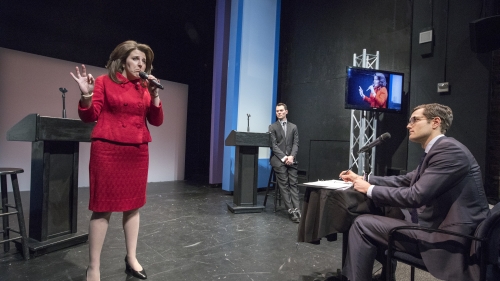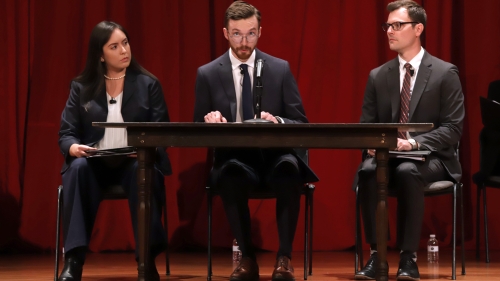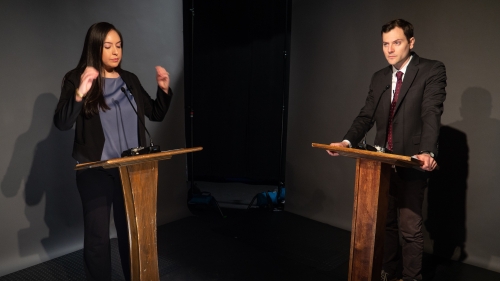NYU Steinhardt and Clinical Professor Joe Salvatore are pioneering a distinctive approach to educational theatre with the Verbatim Performance Lab (VPL).

Pictured: Rachel Tuggle Whorton, Daryl Embry, and Andy Wagner
Credit: Richard Termine for The New York Times
The Creation of the VPL
Salvatore, founder and director of the VPL, has been making theatre from interviews since he was a graduate student at the University of Massachusetts Amherst. His experience led up to the creation and staging of the 2017 Off Broadway production Her Opponent, which recreated excerpts of the 2016 presidential debates between Donald Trump and Hillary Clinton with the gender roles flipped.
Her Opponent originally began as a project for Maria Guadalupe, a former Columbia Business School associate professor and economist now teaching at INSEAD in France.
“Maria wanted a series of videos from the Clinton/Trump debates with the genders switched to use in her course about management,” says Salvatore. “To test out the production, we ran it at NYU and it kind of exploded – everyone was talking about it.”
A test run at NYU led to two months at the Jerry Orbach Theater in Times Square, which in turn led to a nomination for Best Unique Theatre Experience from New York City's Off Broadway Alliance.
“After Her Opponent closed, I realized the powerful impact the performance had on audiences because their eyes were opened in new ways about the candidates when the genders were switched,” says Salvatore, who has been teaching at NYU for nearly 20 years. “Verbatim performance seemed to be an interesting tool to get folks to talk about current events, media consumption, and bias, and NYU agreed.”
And so, the VPL was born in 2017, sitting within the Educational Theatre program in the Department of Music and Performing Arts Professions to continue exploring social and cultural perceptions through verbatim documentary theatre and performance.
What is Verbatim Performance?
Also known as ethnodrama or documentary theatre, verbatim performance involves actors portraying as precisely as possible the exact words and gestures of people from media artifacts, such as video and audio recordings, interviews, court reports, or newspaper articles.
Think of actors playing the roles from a presidential debate, or a conversation between a newscaster and a public figure – but with a twist, such as the switching of the gender or racial identities of the key players.
After a short theatre presentation, the audience is led into a discussion by a moderator to explore their reactions, often leading to frank conversations about inherent biases, discriminatory behavior, microaggressions, and more.

Pictured: Analisa Gutierrez, Robert Thaxton-Stevenson, and Daryl Embry
Credit: ©Gallo: Courtesy of NYU Photo Bureau
Powerful Performances Lead to Open Discussions
This creative take on applied or community-engaged theatre has found enormous success over the past few years. The VPL has performed for audiences of all ages, and has facilitated workshops and residencies ranging from K–12 classrooms to community centers and prisons, sparking honest conversations on topics that can often feel taboo, such as racism and sexism. From its inception, the VPL created live and recorded performances, so when the pandemic began, they pivoted to create opportunities for virtual productions and workshops to keep the conversations going, especially in a time of civil unrest.
For example, in Portraits US: COVID-19, audiences view a 15-minute video performance of interview excerpts conducted with people living across the country between April 2020 and April 2021. Using a Google survey, each audience member gets 10 seconds in between each performance to answer where and when they think the interview was conducted. The data is compiled into pie charts at the end of the production, and audiences are led into a discussion about the assumptions they made about geography based on people’s experiences with COVID-19.
Beyond the classroom and into the boardroom, the VPL also has implications in challenging the perceptions of business leaders around the world.
“Right before the pandemic, we were contacted by the CEO of a company who coaches Fortune 500 executives,” says Salvatore. “In their work to train these executives around diversity, equity, and inclusion, they wanted to explore how our verbatim performance techniques could allow for more open conversations about their biases in a safe space without feeling threatened.”

Pictured: Analisa Gutierrez and Daryl Embry
Credit: Nora Lambert for NYU-TV
Training the Future of Verbatim Performance
The popularity of the VPL continues to grow, with more than a dozen student interns this past year and a core acting ensemble of 10, many of whom are alumni or adjunct faculty of the Educational Theatre program. This summer, 13 students participated in an intensive course in which they learned how to create, stage, and facilitate verbatim performances themselves.
The VPL is also engaging in cross-disciplinary research with Elisabeth King, associate professor of international education and politics in Steinhardt’s Department of Applied Statistics, Social Science, and Humanities to quantify what reversed identities do to audiences’ perceptions, first looking at interactions from the 2020 Democratic primary between Pete Buttigieg and Amy Klobuchar. Soon they will explore what happens when both gender and race are flipped in a performance of the 2020 Vice Presidential Debate between Mike Pence and Kamala Harris – the infamous “Mr. Vice President, I’m speaking” exchange. This project has received support from the American Political Science Association (APSA) through the Herring Fund for Political Art.
“Verbatim performance has a way of encouraging people to engage in conversations in a productive way,” says Salvatore. “The work is not about asking folks to change their minds; it’s about helping them to recognize and understand why they believe what they believe. Along the way if that creates some cognitive dissonance around the assumptions that people make, then I think that’s really useful.”
Learn more about the VPL, their performances, and the Educational Theatre program, and support more important VPL productions and research.
